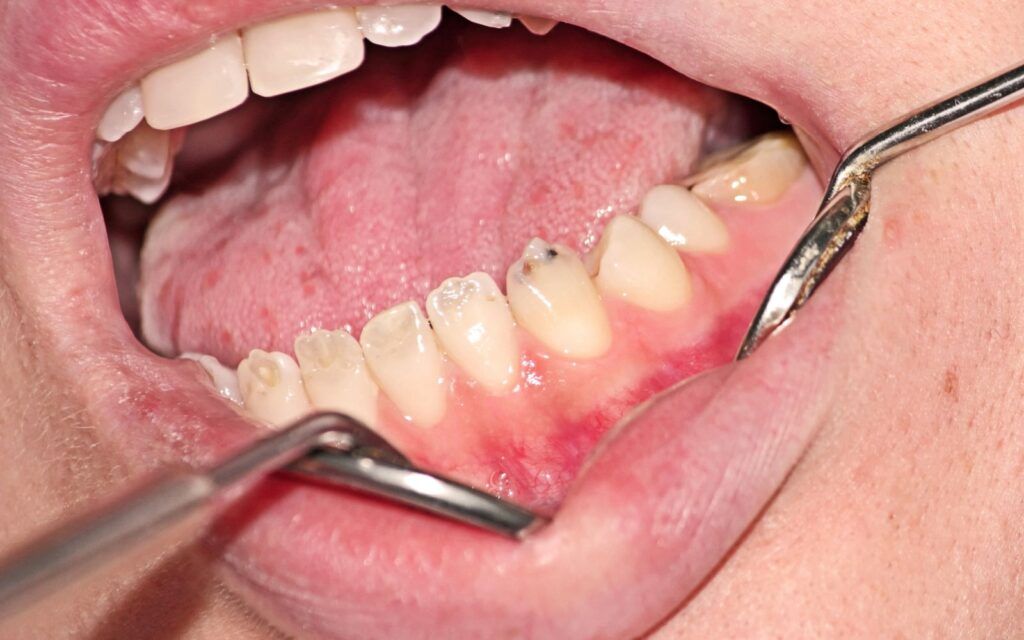Many factors influence our oral health, including our dental hygiene practices and regular visits to the dentist. Genetics also play a role and can lead to conditions like Dentinogenesis Imperfecta (DI), affecting approximately 1 in 7,000 individuals. When facing oral health challenges, seeking support from a dentist is crucial to maintaining a healthy smile. Our team at Tulsa Precision Dental is dedicated to assisting patients in overcoming conditions like DI through education and exceptional care.
What is Dentinogenesis Imperfecta?
Dentinogenesis imperfecta is a genetic disorder that affects the tooth’s dentin layer, causing problems with the tooth’s internal structure. This condition is primarily caused by genetic mutations that affect dentin formation and is usually inherited from either parent. However, the condition can also arise spontaneously without any previous family history of the disorder.
According to the Genetic and Rare Diseases Information Center, the abnormality can be traced back to a mutation in the DSPP gene, which writes the blueprints for dentin. These mutations can develop in three classifications, which include:
- Type I: Type I occurs in people who experience osteogenesis imperfecta, which causes the bones to break and fracture easily without any obvious cause or injury.
- Type II: Type II occurs in people with no co-existing hereditary disorders but in people who exhibit signs of age-related hearing loss or deafness. As the most common type of dentinogenesis imperfecta, this condition most commonly occurs in older generations.
- Type III: Type III is considered an extremely rare and isolated classification, as it occurs in people without any hereditary disorders and in isolation. The latest studies show this type occurs with a group of individuals in southern Maryland.
One of the most prominent symptoms of Dentinogenesis Imperfecta include tooth discoloration. The affected teeth will appear translucent, with either a bluish-gray or yellowish-brown color. The teeth will also appear bulbous-shaped and exhibit abnormal wear, making them more susceptible to tooth breaks and loss. In more severe cases, the enamel will be thin and rapidly deteriorate. This condition can appear in both the primary teeth and the adult teeth.
Although dentinogenesis imperfecta isn’t curable, your dentist can provide several treatment options to help maintain your oral health. In these cases, your dentist will provide treatments to strengthen the teeth and prevent further damage to the enamel and dentin. In some cases, however, tooth extractions may be necessary if the dentin damage is severe. Some of the treatment options your dentist can provide include:
- Fluoride Treatments: Besides recommending good oral hygiene practices like brushing, flossing, and regular dental visits, dentists can provide fluoride treatments as a preventative measure to help strengthen the enamel and dentin and mitigate the effects.
- Restorative Procedures: In cases where the damage to the enamel and dentin is prominent, your dentist can provide restorative options such as crowns, bonding, and veneers to help protect the teeth from further harm and enhance your appearance.
- Prosthetic Solutions: When the damage to the teeth is too severe to provide crowns and veneers, other options such as implants, bridges, and dentures can be provided to restore your smile and appearance.
Maintaining ongoing and consistent oral hygiene and dental care is essential for patients with this condition. Failure to preserve the long-term health of their teeth puts them at risk of breakage, wear, and significant pain.
Why You Should Visit Tulsa Precision Dental For Your Dental Care
Having conditions like Dentinogenesis impefecta can cause you to lose confidence in your smile. However, visiting your dentist can help you get the treatment you need and get your smile back to pristine condition. At Tulsa Precision Dental, Dr. Chris and Kristie Vinson will assess your symptoms and develop an appropriate treatment plan through the following:
- Dental Examination: This involves a thorough dental examination conducted by a dentist who specializes in or has experience with DI. Our dentists will evaluate the patient’s dental history, perform a visual inspection of the teeth, and may take dental X-rays or other imaging scans to assess the condition of the teeth and underlying structures.
- Genetic Testing: Genetic testing may be recommended to determine the genetic mutation responsible for the condition and help identify other genetic disorders or family history patterns.
- Symptom Assessment: Our dentists will assess the severity of the symptoms and their impact on the patient’s oral health and quality of life. This assessment includes examining the tooth discoloration, enamel thickness, and structural abnormalities and evaluating any associated dental problems like tooth sensitivity, wear, or breakage.
- Treatment Planning: Our dentists will develop a personalized treatment plan tailored to your needs based on the examination findings. The plan will consider factors such as the patient’s age, overall oral health, the severity of DI symptoms, and any associated dental complications.
Start prioritizing your oral health by contacting us today at (918) 492-1917 or contacting our team in Tulsa, OK. We will schedule your initial appointment and consultation, discuss your dental concerns, and develop a treatment plan tailored to your needs.




